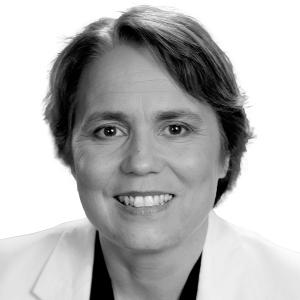
Sandrine Donnars
To what extent are you fostering energy transition?
Nowadays, more than 60% of the French energy mix still relies on fossil fuels (oil, gas). My objective is to support my customer base in any initiative aimed at replacing these fossil fuels with decarbonized electricity and renewable energies by, for instance, financing photovoltaic parks.
We also offer our customers more circularity through waste recovery, maintenance, reconditioning and equipment sales. We help them measure, reduce and offset their carbon footprint as part of our rental agreements. We manage with them the life cycle of the equipment, from delivery to end of life, notably through our partnerships with adapted companies. In this way, we offer a second life to equipment. We also provide solutions for reselling end-of-life equipment to their employees through our EcoTwice offer.
Under our facilities management contracts, we optimize our customers' inventory control and handle logistics and transport to facilities-managed sites to limit the purchase of equipment and its transportation.
In the field of applications development, as carried out by our Apps, Cloud & Data business line, our developers are trained in FinOps and Devops methods, and made aware of eco-designed applications.
What are the criteria used by your customer to assess impact?
16 commitments around 4 challenges:
- Promoting carbon neutrality: achieving carbon neutrality by 2050 / Supporting R&D to actively monitor negative emission technologies and come up with innovative solutions / Decarbonizing through electric mobility solutions
- Preserving the planet's resources: commitment to the act4nature initiative / restoration of water extracted by the means of production / giving a second life to objects through their re-use
- Fostering well-being and solidarity: strengthening the company's gender diversity ambitions and setting a benchmark for the industry / EDF vigilance plan / mobilization against energy insecurity
- Promoting responsible development: strengthening a long-standing dialogue with civil society / building the Nachtigal dam in Cameroon /certified digital transformation
How do you measure them?
Given the complexity of these commitments, EDF is organizing this monitoring as part of its annual impact report, including ESG indicators and a monthly measurement of CO2 emissions, using the LCA (Life Cycle Assessment) method.
How would you describe responsiveness in commercial relationships?
Listening to customers and being available to respond to their needs, creating a relationship based on trust that allows for dialogue and discussion in order to devise strategies adapted to the issues they face.
What is a responsible company?
A responsible company is a company that not only abides by its legal obligations in terms of environmental protection, diversity, and employee well-being, but also goes beyond them. It is aware of the environmental and social impacts it causes, measures them, and compensates for them through concrete initiatives that are made public and monitored by neutral and professional organizations. It incorporates CSR policy at all levels: internally in its interactions with staff, but also externally with customers, partners, suppliers, or any other party with whom it interacts.
